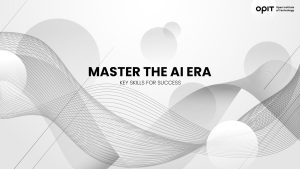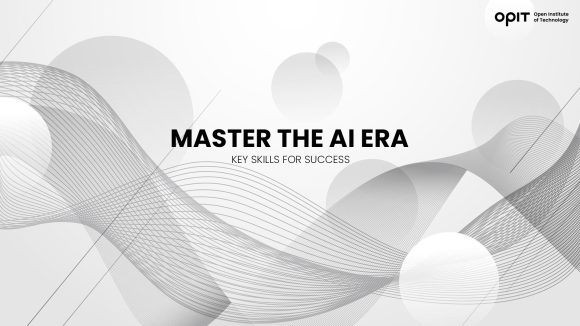

The world is rapidly changing. New technologies such as artificial intelligence (AI) are transforming our lives and work, redefining the definition of “essential office skills.”
So what essential skills do today’s workers need to thrive in a business world undergoing a major digital transformation? It’s a question that Alan Lerner, director at Toptal and lecturer at the Open Institute of Technology (OPIT), addressed in his recent online masterclass.
In a broad overview of the new office landscape, Lerner shares the essential skills leaders need to manage – including artificial intelligence – to keep abreast of trends.
Here are eight essential capabilities business leaders in the AI era need, according to Lerner, which he also detailed in OPIT’s recent Master’s in Digital Business and Innovation webinar.
An Adapting Professional Environment
Lerner started his discussion by quoting naturalist Charles Darwin.
“It is not the strongest of the species that survives, nor the most intelligent that survives. It is the one that is the most adaptable to change.”
The quote serves to highlight the level of change that we are currently seeing in the professional world, said Lerner.
According to the World Economic Forum’s The Future of Jobs Report 2025, over the next five years 22% of the labor market will be affected by structural change – including job creation and destruction – and much of that change will be enabled by new technologies such as AI and robotics. They expect the displacement of 92 million existing jobs and the creation of 170 million new jobs by 2030.
While there will be significant growth in frontline jobs – such as delivery drivers, construction workers, and care workers – the fastest-growing jobs will be tech-related roles, including big data specialists, FinTech engineers, and AI and machine learning specialists, while the greatest decline will be in clerical and secretarial roles. The report also predicts that most workers can anticipate that 39% of their existing skill set will be transformed or outdated in five years.
Lerner also highlighted key findings in the Accenture Life Trends 2025 Report, which explores behaviors and attitudes related to business, technology, and social shifts. The report noted five key trends:
- Cost of Hesitation – People are becoming more wary of the information they receive online.
- The Parent Trap – Parents and governments are increasingly concerned with helping the younger generation shape a safe relationship with digital technology.
- Impatience Economy – People are looking for quick solutions over traditional methods to achieve their health and financial goals.
- The Dignity of Work – Employees desire to feel inspired, to be entrusted with agency, and to achieve a work-life balance.
- Social Rewilding – People seek to disconnect and focus on satisfying activities and meaningful interactions.
These are consumer and employee demands representing opportunities for change in the modern business landscape.
Key Capabilities for the AI Era
Businesses are using a variety of strategies to adapt, though not always strategically. According to McClean & Company’s HR Trends Report 2025, 42% of respondents said they are currently implementing AI solutions, but only 7% have a documented AI implementation strategy.
This approach reflects the newness of the technology, with many still unsure of the best way to leverage AI, but also feeling the pressure to adopt and adapt, experiment, and fail forward.
So, what skills do leaders need to lead in an environment with both transformation and uncertainty? Lerner highlighted eight essential capabilities, independent of technology.
Capability 1: Manage Complexity
Leaders need to be able to solve problems and make decisions under fast-changing conditions. This requires:
- Being able to look at and understand organizations as complex social-technical systems
- Keeping a continuous eye on change and adopting an “outside-in” vision of their organization
- Moving fast and fixing things faster
- Embracing digital literacy and technological capabilities
Capability 2: Leverage Networks
Leaders need to develop networks systematically to achieve organizational goals because it is no longer possible to work within silos. Leaders should:
- Use networks to gain insights into complex problems
- Create networks to enhance influence
- Treat networks as mutually rewarding relationships
- Develop a robust profile that can be adapted for different networks
Capability 3: Think and Act “Global”
Leaders should benchmark using global best practices but adapt them to local challenges and the needs of their organization. This requires:
- Identifying what great companies are achieving and seeking data to understand underlying patterns
- Developing perspectives to craft global strategies that incorporate regional and local tactics
- Learning how to navigate culturally complex and nuanced business solutions
Capability 4: Inspire Engagement
Leaders must foster a culture that creates meaningful connections between employees and organizational values. This means:
- Understanding individual values and needs
- Shaping projects and assignments to meet different values and needs
- Fostering an inclusive work environment with plenty of psychological safety
- Developing meaningful conversations and both providing and receiving feedback
- Sharing advice and asking for help when needed
Capability 5: Communicate Strategically
Leaders should develop crisp, clear messaging adaptable to various audiences and focus on active listening. Achieving this involves:
- Creating their communication style and finding their unique voice
- Developing storytelling skills
- Utilizing a data-centric and fact-based approach to communication
- Continual practice and asking for feedback
Capability 6: Foster Innovation
Leaders should collaborate with experts to build a reliable innovation process and a creative environment where new ideas thrive. Essential steps include:
- Developing or enhancing structures that best support innovation
- Documenting and refreshing innovation systems, processes, and practices
- Encouraging people to discover new ways of working
- Aiming to think outside the box and develop a growth mindset
- Trying to be as “tech-savvy” as possible
Capability 7: Cultivate Learning Agility
Leaders should always seek out and learn new things and not be afraid to ask questions. This involves:
- Adopting a lifelong learning mindset
- Seeking opportunities to discover new approaches and skills
- Enhancing problem-solving skills
- Reviewing both successful and unsuccessful case studies
Capability 8: Develop Personal Adaptability
Leaders should be focused on being effective when facing uncertainty and adapting to change with vigor. Therefore, leaders should:
- Be flexible about their approach to facing challenging situations
- Build resilience by effectively managing stress, time, and energy
- Recognize when past approaches do not work in current situations
- Learn from and capitalize on mistakes
Curiosity and Adaptability
With the eight key capabilities in mind, Lerner suggests that curiosity and adaptability are the key skills that everyone needs to thrive in the current environment.
He also advocates for lifelong learning and teaches several key courses at OPIT which can lead to a Bachelor’s Degree in Digital Business.
Have questions?
Visit our FAQ page or get in touch with us!
Write us at +39 335 576 0263
Get in touch at hello@opit.com
Talk to one of our Study Advisors
We are international
We can speak in:




